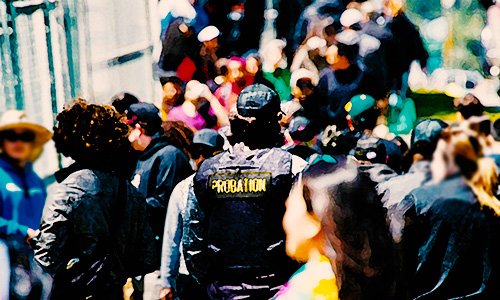In Arizona, felony probation is an alternative to prison time for defendants facing felony charges. The terms are often much stricter than for misdemeanor probation. Felony probation is usually either supervised or intensive. Violating the terms of felony probation can lead to revocation, which will send the probationer to prison for the rest of their sentence.

Probation is an alternative to prison time. It is also referred to as “community supervision.”
1. What is felony probation in Arizona?
Probation is a potential punishment for a criminal defendant in Arizona that either completely or partially replaces a prison sentence. When the underlying criminal offense was a felony, defendant can be sentenced to felony probation. This often happens as a part of a plea deal, sometimes as early as the arraignment.
Often referred to as “community supervision,” probation is a way for law enforcement to watch over a convicted defendant without having them physically stay in prison. Instead, probationers are released back into the community and closely supervised. While they are not inmates serving jail time, probationers still have to follow strict rules set out by the court.
In some cases, defendants on felony probation avoid prison, altogether. In others, they serve a part of their sentence behind bars and part of it on community supervision.
Felony probation is nearly always one of the following 2 types of probation:
- intensive, or
- supervised probation
Intensive probation has extremely strict rules for probationers. They are not allowed to do much aside from work, go to school, and perform community restitution. They also have to report to their probation officer very frequently, sometimes multiple times per day.1
Supervised probation is more common. The terms of release under supervised probation are not as stringent as they are under intensive probation, though regular check-ins with a probation officer are still required.
Unsupervised probation is rare for felony offenses. It is generally reserved for low-level misdemeanor offenses.
2. Are there any crimes that are ineligible?
Generally, only non-dangerous offenses that were committed by a first-time offender are eligible for felony probation. The following offenses are among those that are ineligible for probation and that come with mandatory prison time:
- all dangerous offenses,2
- most dangerous crimes against children,3
- felonies committed while the defendant was out on probation,4
- offenses committed by someone who already had a prior felony conviction,5
- felonies committed to promote or assist a criminal street gang6 or human smuggling,7
- certain types of theft and fraud involving more than $100,000,8
- fraud to procure the manufacture, sale, or marketing of opioid drugs,9
- drug possession with an intent to sell,10
- most drug offenses involving methamphetamine,11
- manufacturing any dangerous drug,12 and
- selling drugs in a school zone.13
However, the defendant’s background or specific circumstances surrounding the offense can make them ineligible for felony probation. Talking with a criminal defense attorney at a law firm is the best way to determine for sure if felony probation is a possibility or not.
3. What are common terms of felony probation?
The rules and terms of probation are in the judge’s discretion in Arizona. At the sentencing hearing, the judge will generally tailor the terms to the particular defendant and the specific offense that was committed.
For defendants convicted of a felony, some of the most common terms of felony probation can include:
- nightly curfews,
- strict travel limitations,
- regular appointments with a probation officer,
- giving up all firearms in the probationer’s possession,
- providing prior consent to random searches of the probationer’s person, home, or vehicle,
- paying victim restitution,
- giving up drugs or alcohol,
- consenting to random and unannounced drug tests,
- prohibitions against committing a new crime while on probation,
- no-contact orders to prevent the probationer from meeting with known associates,
- community service,
- drug or alcohol treatment,
- a driver’s license suspension, if the offense was for driving under the influence (DUI),
- protective orders, especially if the offense involved domestic violence,
- house arrest,
- electronic monitoring, usually with an ankle bracelet, and
- therapy or counseling sessions.
The terms chosen for probation will reflect the judge’s interest in keeping the probationer monitored, preventing recidivism, and protecting the public. However, protective orders can negatively implicate child custody arrangements.
Many areas in Arizona, including Maricopa County, Phoenix, and Mesa, have designated drug courts for probationers who have substance abuse problems, a clean criminal background, and who have committed a non-violent drug offense.14

The length of probation is up to the discretion of the judge
4. How long does it last?
Just like the terms of felony probation, the length is also in the discretion of the judge. However, there are presumptive lengths that depend on the class of felony committed15:
| Type of offense | Probation period |
| Class 2 felony | 7 years |
| Class 3 felony | 5 years |
| Class 4 felony | 4 years |
| Class 5 or Class 6 felony | 3 years |
DUI offenses, however, have their own presumed probationary period16:
| Offense | Length of probation |
| DUI with a blood alcohol content (BAC) at or above 0.15% | 5 years |
| Aggravated DUI | 10 years |
Finally, there are some criminal convictions that carry the potential for lifetime probation, like:
- terrorism,
- the unlawful use of an infectious substance,
- stalking,
- failure to register as a sex offender,
- sex offenses,
- child sex trafficking,
- sexual exploitation of children, or
- child abuse.17
In many cases, felony probation requires the payment of restitution to the victim. If the probationary period ends but restitution has not yet been paid in full, the judge can extend probation by up to 5 years.18
5. Is early termination possible?
Yes. Under Arizona law, a court order can initiate the early termination process or, more often, the probationer can start it by filing a Petition for Early Termination.19
In most cases, people on felony probation will only be granted an early termination if:
- no new criminal charges have been filed against the probationer,
- they have completed at least half of the term,
- restitution has been paid,
- fees and courts costs have been paid for their criminal case,
- there were no violations of the terms and conditions of probation, and
- the probationer completed all of their treatment programs.
6. What happens after a probation violation?
In Arizona, if a term of probation is violated, probation can be revoked and the probationer sent to prison for the rest of his or her sentence.
Accusations of a violation of probation are serious. They usually come from the probation officer, who files a Petition to Revoke Probation with the court. In some cases, the allegation comes from the judge. In either case, a court date will be scheduled for a probation violation hearing.
At the hearing, the prosecutor will present evidence that there was a violation, while the probationer’s criminal defense lawyer will argue that there was no violation. The judge will weigh the evidence and make a decision. If the judge decides that felony probation was violated, he or she can revoke probation and send the probationer to prison, or can include additional terms of release to make probation even stricter.
Legal References:
- ARS 13-913 and 13-914.
- ARS 13-704(G).
- ARS 13-705.
- ARS 13-917(B).
- ARS 13-703(O).
- ARS 13-714.
- ARS 13-715.
- ARS 13-2310(C) and 13-1802(H).
- ARS 13-2310(C).
- ARS 13-3407.
- ARS 13-3407(F).
- Same.
- ARS 13-3411(B).
- ARS 13-3422(A) and (L).
- ARS 13-902.
- ARS 13-902(B).
- ARS 13-902(E) and (F).
- ARS 13-902(C).
- ARS 13-901(E).
